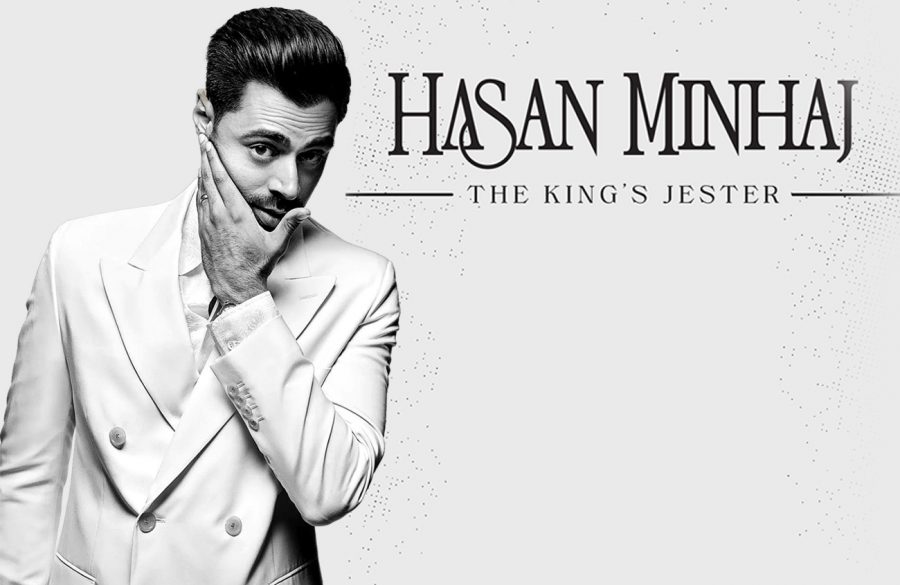Comedians often embellish for comedic effect, but when exaggeration is used to manipulate emotions for connection, it takes a darker turn. On Sept. 15, The New Yorker ran a story titled “Hasan Minhaj’s ‘Emotional Truths’” in which journalist Clare Malone uncovers an unsettling truth about the comedian’s stand-up: Minhaj had been fabricating anecdotes. This is particularly shocking because of how much his stand-up hinges on these stories surrounding his experience with racism and islamophobia. Instead of denying Malone’s findings, Minhaj justified the fabrications as ‘emotional truths’—fictitious stories propelled by a legitimate emotional reaction or experience.
In his 2022 Netflix special The King’s Jester, Minhaj shares an anecdote from his middle school days in 2002 when a muscular, white F.B.I. informant, Brother Eric, barged into his family’s Sacramento-area mosque under the guise of converting to Islam. Minhaj goes on to tell stories about Brother Eric going for dinner at Minhaj’s house and teaching fitness classes to the community’s teenage boys. Minhaj tells this story to illustrate what it was like living as a Muslim-American teenager in the immediate aftermath of 9/11, and so when he recounts that in a moment of teenage rebellion, he decided to tell Brother Eric that he was going to get his pilot’s license—only to be slammed up against a police car moments later, it feels particularly resonant to the ways in which islamophobia was so omnipresent during the war on terror.
However, none of this ever happened to Hasan Minhaj. While “Brother Eric” was a real F.B.I. informant named Craig Monteilh, he’s never been to Minhaj’s mosque. Monteilh worked in counterterrorism in Southern California, far from the Sacramento area, and was still in prison when Minhaj alleges the story took place.
This goes beyond artistic license. When stand-up comedians embellish a story for comedic effect, the goal is to get a bigger laugh. Here, key details of the story are altered attempts to communicate a larger ideal about systemic injustice or the widespread commonality of islamophobia. By inventing fictitious anecdotes, Minhaj is intentionally deceiving the audience for the purpose of centring himself within a discussion of racism, rather than directly referring to the actual people whose experiences are behind the story. The problem with presenting these emotional truths is that they exploit the traumatic life experiences of others solely for the purpose of entertainment and gaining social clout, without changing the system.
Minhaj does not stop there. He also uses the real names of people in his anecdotes, which permanently alters their public perception, especially since these are televised specials and not just stage performances. In one instance, Minhaj doxxed a high school crush after claiming that she accepted his invitation to prom only to later reject him when he came to pick her up. He claimed that the girl’s parents didn’t want him taking photos with a brown boy out of fear of what their relatives might say. In reality, the girl, who was a close friend of Minhaj’s, turned him down days before the dance. In the years following the special’s release, the woman faced online threats and doxxing due to Minhaj’s failure to properly hide her identity. Her daily life is forever changed because of Minhaj’s desire to communicate a feeling through an “emotional truth” rather than reality.
These emotional truths break the trust that was the crucial facet of Minhaj’s relationship with his audience. His Peabody Award-winning Netflix show, Patriot Act, became somewhat of a beacon of hope in the realm of political comedy during the Trump presidency. The show’s combination of seemingly personal anecdotes from his youth with the breakdown of overtly racist policies, like the Muslim Travel Ban, created a sense of solidarity and catharsis between Minhaj and his audience. His approach to comedy felt level-headed, making intelligently crafted arguments that reassured viewers of their anger and comforted them with a sense of understanding. Criticisms of the New Yorker article often hinge on the fact that lots of comedians embellish their stories. What this criticism is missing specifically is how Minhaj having stories that resonated with South Asian audiences directly translated into a boost in his popularity. His embellishments weren’t just in service of creating better art but in service of raising his stature within the conversation around islamophobia during the War on Terror into the Trump presidency years. These revelations are disheartening to many fans, who felt like they had finally found a sense of authentic representation within relatively mainstream comedy. Minhaj’s embellishments not only let down a community that has done so much to support his career but could also bring about a wave of people questioning other comics’ real experiences with racism. For fans and comedians, this story is not only deeply demoralizing, but sets an awful precedent for truth, sincerity, and authenticity in comedy.








